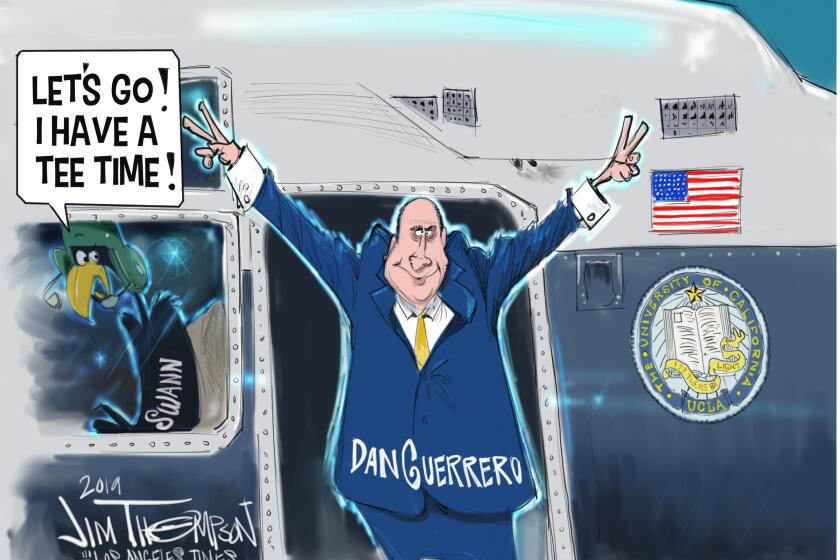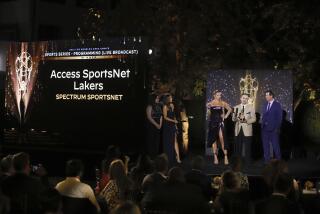Cubs fans: Will Sinclair convince your team to copy Dodgers with a TV blackout?
- Share via
In those not-so-good-old-days when Frank and Jamie McCourt owned the Dodgers, Jamie introduced herself to Los Angeles by criticizing previous ownership for not setting the attendance bar high enough.
“They should have been drawing 4 million fans, not 3 million fans,” she told The Times in 2004.
We laughed, but guess what? On Sunday, the Dodgers play their final home game of the regular season. Their attendance should hit 3.98 million. If the Dodgers had one more home game, they would exceed 4 million.
The Dodgers have sold 3 million tickets in 18 of the past 19 years. The exception: 2011, when a fan boycott helped chase the McCourts out of the owners’ box and into bankruptcy court. The Dodgers were sold to Guggenheim Baseball Management in a court-supervised auction in 2012. They have won the National League West every year since, and have led the league in attendance every year too.
We do not take kindly to the disparagement of Dodgers fans. With that, meet Chris Ripley.
Ripley is the president and chief executive officer of Sinclair Broadcast Group. The Chicago Cubs also play their final home game of the regular season Sunday. When they return to Wrigley Field in 2020, Ripley is responsible for making sure Cubs fans can see their team on television.
Guggenheim got the Dodgers their own cable channel, but, six years after it launched, it remains off the air in the homes of millions of fans. The Cubs are getting their own channel next year, with Sinclair as their television partner. Why is Ripley confident he can get the Cubs into all the homes in Chicago?
Each year the Society for American Baseball Research holds a contest that’s part bar exam, part National Spelling Bee.
“It’s a Cubs town, the fan base is incredibly loyal, and we think the market can support that,” he told The Times in May.
As if to underscore the point, Ripley told the Washington Post the Dodgers’ fan base, “isn’t as strong or as concentrated.”
We asked a Sinclair representative if we could ask Ripley about whatever market research might have led him to that conclusion. We didn’t hear from Ripley.
We did hear from Marc Ganis, whose Sportscorp Ltd. consulting firm is based in Chicago.
“The fundamental reality is: The fans in this market, by and large, prefer the Cubs,” Ganis said.
Of the four pro teams that currently share one cable channel in Chicago, the Cubs generally draw better ratings than the other three teams combined, Ganis said. The Cubs are leaving those other teams -– the White Sox, Bulls and Blackhawks –- on NBC Sports Chicago. So long as Michael Jordan is not coming back, none of those teams can rival the Cubs for local prominence in the way the Lakers rival the Dodgers.
When the Dodgers and Time Warner Cable initially asked for a monthly fee of close to $5 per subscriber for the SportsNet LA channel, cable and satellite companies in the Southland balked.
In Chicago, the monthly fee for NBC Sports Chicago is $4.23, as estimated by SNL Kagan, a media research group. That could leave room for a comparably priced Cubs channel, Ganis said.
In Los Angeles, Kagan estimates the combined monthly fee for Fox Sports West, Prime Ticket and Spectrum’s Lakers channel is $10.23 –- without the Dodgers channel.
“The price per subscriber was getting to be out of control,” Ganis said. “It’s nowhere near out of control in Chicago.”
In this age of streaming, however, even a small price increase could accelerate the loss of subscribers, popularly referred to as cord-cutting. Cable companies traditionally sell a bundle of channels, in which every subscriber pays for every channel.
“Paying for something you don’t want, which has been a great business model for the past 30-plus years, is increasingly challenged in the new world order,” said Rich Greenfield, partner and analyst at LightShed Partners in New York.
“You don’t sign up for Netflix and not watch it. You don’t sign up for HBO and not watch it. You pay for what you want, and you get rid of what you don’t want. The whole concept of everybody paying for things they don’t want feels increasingly antiquated.”
The Dodgers and Time Warner Cable wanted close to $5 per month from all subscribers, whether they watched SportsNet LA or not. On Spectrum, the successor to Time Warner Cable, about 5% of subscribers watch the Dodgers.
Letters to the L.A. Times sports department
Comcast, the dominant cable provider in the Chicago area, lost 30,000 subscribers there last year alone, according to Kagan. The company also lost 480,000 subscribers across the country, according to Statista.
The Cubs attract more viewers than the Dodgers, but not so many more that the risk of alienating Cubs fans by not carrying the team channel would necessarily be greater than the risk of alienating the majority of the audience that cares nothing for Anthony Rizzo and could abandon Comcast for Netflix or Hulu.
“The bundle already is in secular decline,” Greenfield said, “and trying to jam more channels into everybody’s bundle feels very tone-deaf in 2019.”
The cost of sports channels has grown so high that DirecTV and other providers determined they would be better off by not carrying SportsNet LA. In July, Dish Network stopped carrying 22 sports channels, including Fox Sports West and Prime Ticket, citing the high costs.
“It doesn’t look good that the regional sports will ever be on Dish again,” Dish chairman Charlie Ergen told investors.
The Dodgers believed their blackout would be temporary. At some point, DirecTV would have to strike new deals for the regional sports channels they owned, and the Dodgers thought DirecTV would not want to risk a similar blackout of its own sports channels in other markets. The Dodgers lost that bet.
Time Warner Cable was selling the broadcasts for one major league team. Sinclair is selling 22 teams, and the company owns 191 television stations across the United States. In theory, Sinclair could leverage those holdings into a Cubs deal –- for example, by telling Comcast that no deal in Chicago means no deal for Channel 12 and the Reds’ cable channel in Cincinnati.
Perhaps viewers in Cincinnati would rebel. But the overwhelming majority of Sinclair stations are in smaller markets, ones without major league sports.
“Are they in the biggest cities? No,” Greenfield said. “That’s part of the problem I think Sinclair faces in trying to use the TV stations as leverage.”
The Dodgers also learned that persuading fans to change their cable or satellite provider is a challenge. Some fans opted not to deal with the hassle of changing email accounts, or returning equipment to one company and installing equipment for another. For fans that seriously threatened to cancel, DirecTV often pacified them with free NFL Sunday Ticket.
And, for a cable company, the money increasingly is in providing Internet service, not television service.
“In the old days, when you were making so much money in your video business, you couldn’t afford to let a sports channel go off, because you would lose video subscribers. Now video subscribers don’t matter as much,” said a high-ranking industry executive familiar with Comcast’s business.
“The question you’ve got to ask is: If a Cubs fan doesn’t have the Cubs on Comcast video, are they going to turn off their Comcast broadband business? My guess would be very few do.”
The trend toward the broadband business is a national one, which turned the conversation to the Dodgers.
“The thing that has been mind-boggling to me is why Spectrum long ago didn’t offer Sports Net LA as an a la carte channel, with broadband,” the executive said.
In fact, MLB Commissioner Rob Manfred last year encouraged Spectrum to do just that.
“To me, that would have taken all the heat out of the market, people wouldn’t have been as [ticked] off as they are at both sides, and it would have been a nice product for the broadband business,” the industry executive said, “one more reason to get Spectrum vs. AT&T or Verizon or somebody else.”
A Comcast spokesman declined to comment, other than to say negotiations with Sinclair have not started. Michael McCarthy, the general manager of the Cubs’ channel, did not return a message left with a team spokesman.
If the history of this business is any indication, serious negotiations probably won’t take place until spring training, and they could extend beyond opening day. Then we’ll see if the “I Need My Cubs” campaign turns out to be more effective than the “I Need My Dodgers” campaign.
But fans should not be the party responsible for getting a team on television. If you subscribe to pay television, you did your job. You should not have to change TV providers, or hunt for a pirate signal.
The outrageous suggestion that Dodgers fans are somehow not passionate enough because their team is blacked out around town? We have a two-word response to that, straight from the mouth of the Cubs’ most famous broadcaster: Holy cow.
More to Read
Go beyond the scoreboard
Get the latest on L.A.'s teams in the daily Sports Report newsletter.
You may occasionally receive promotional content from the Los Angeles Times.












